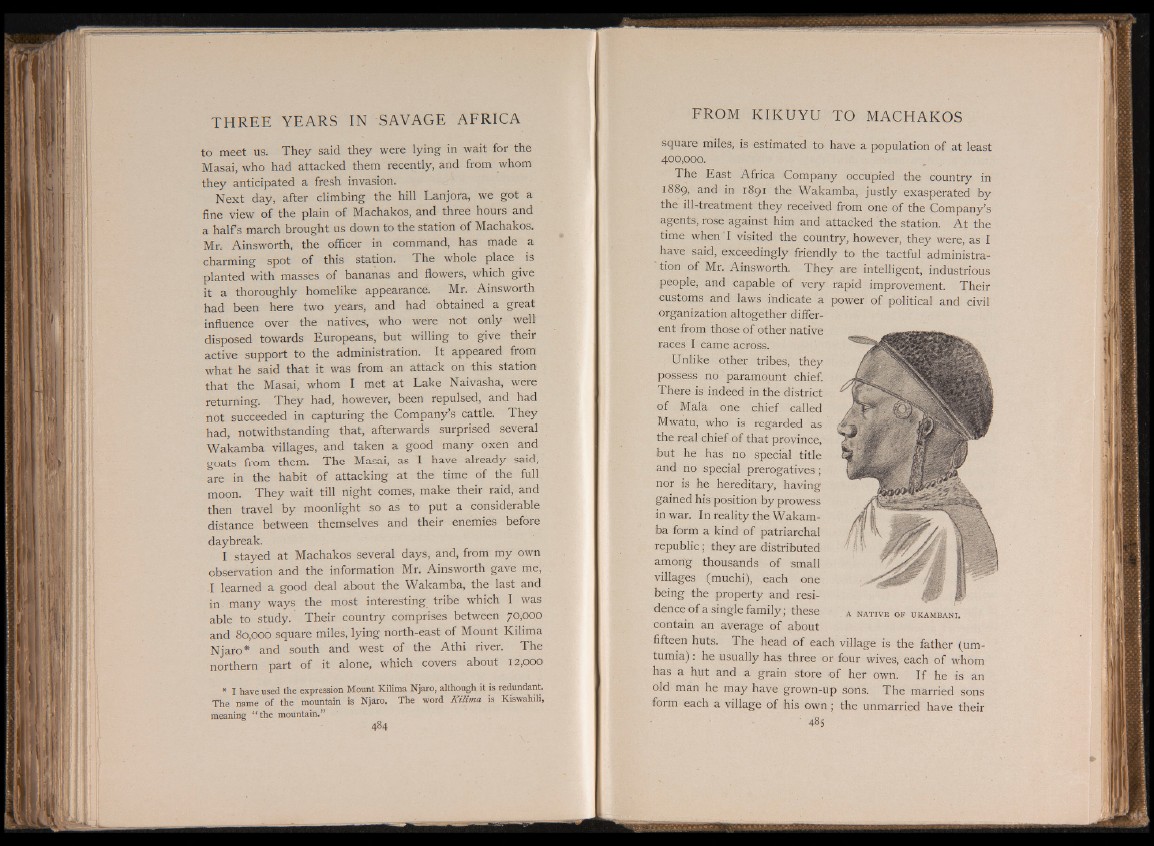
to meet us. They said they were lying in wait for the
Masai, who had attacked them recently, and from whom
they anticipated a fresh invasion.
Next day, after climbing the hill Lanjora, we got a
fine view of the plain of Machakos, and three hours and
a halfs march brought us down to the station of Machakos.
Mr. Ainsworth, the officer in command, has made a
charming spot of this station. The whole place is
planted with masses of bananas and flowers, which give
it a thoroughly homelike appearance. Mr. Ainsworth
had been here two years, and had obtained a great
influence over the natives, who were not only well
disposed towards Europeans, but willing to give their
active support to the administration. It appeared from
what he said that it was from an attack on this station
that the Masai, whom I met at Lake Naivasha, were
returning. They had, however, been repulsed, and had
not succeeded in capturing the Company’s cattle. They
had, notwithstanding that, afterwards surprised several
Wakamba villages, and taken a good many oxen and
goats from them. The Masai, as I have already said,
are in the habit of attacking at the time of the full,
moon. They wait till night comes, make their raid, and
then travel by moonlight so as to put a considerable
distance between themselves and their enemies before
daybreak.
I stayed at Machakos several days, and, from my own
observation and the information Mr. Ainsworth gave me,
I learned a good deal about the Wakamba, the last and
in many ways the most interesting tribe which I was
able to study. Their country comprises between 70,000
and 80,000 square miles, lying north-east of Mount Kilima
Njaro* and south and west of the Athi river. The
northern part of it alone, which covers about 12,000
* I have used the expression Mount Kilima Njaro, although it is redundant.
The name of the mountain is Njaro. The word Kilim a is Kiswahili,
meaning “ the mountain.”
square miles, is estimated to have a population of at least
400,000.
The East Africa Company occupied the country in
1889, and in 1891 the Wakamba, justly exasperated by
the ill-treatment they received from one of the Company’s
agents, rose against him and attacked the station. At the
time when I visited the country, however, they were, as I
have said, exceedingly friendly to the tactful administration
of Mr. Ainsworth. They are intelligent, industrious
people, and capable of very rapid improvement. Their
customs and laws indicate a power of political and civil
organization altogether different
from those of other native
races I came across.
Unlike other tribes, they
possess no paramount chief.
There is indeed in the district
of Mala one chief called
Mwatu, who is regarded as
the real chief of that province,
but he has no special title
and no special prerogatives;
nor is he hereditary, having
gained his position by prowess
in war. In reality the Wakamba
form a kind of patriarchal
republic; they are distributed
among thousands of small
villages (muchi), each one
being the property and residence
of a single family; these
contain an average of about
fifteen huts. The head of each village is the father (um-
tumia): he usually has three or four wives, each of whom
has a hut and a grain store of her own. If he is an
old man he may have grown-up sons. The married sons
form each a village of his own; the unmarried have their
■ 485
A NATIVE OF UKAMBANI.